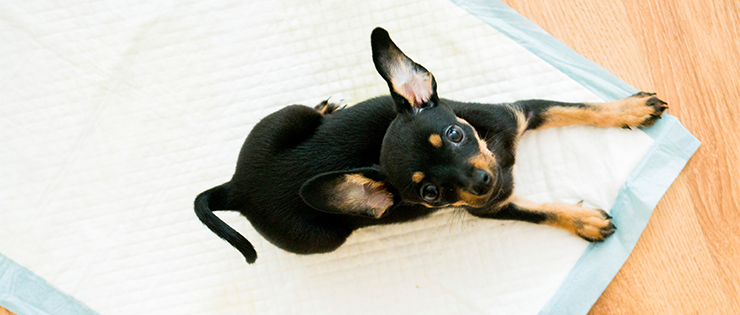
When we think about incontinence in dog’s, we usually link it to a consequence of old age. But, incontinence can be caused by a multitude of factors, and can be a signal that your dog needs medical attention. Firstly, if you do witness your dog having an accident, it is important that you do not punish them for it. Instead gently take them outside and allow them to complete the elimination there. No matter why your dog is leaking urine, they should not be physically punished for it. Making a dog feel anxious for a physiological and uncontrollable ailment is unfair and unnecessary. Even if the cause of inappropriate elimination (not incontinence) is behavioural, physical corrections can make your dog more anxious, making them more likely to seek areas to urinate where they know you can’t see them. In other words, they learn to do it behind your back.
So, what is incontinence exactly?
Incontinence is the involuntary discharge of urine, most commonly seen in spayed females (sometimes males with prostate abnormalities), and usually occurs when your dog is asleep or resting. Your dog’s bedding areas therefore, are the most affected, and this can tell you that the urinary issue is more likely a medical/hormonal ailment, rather than a behavioural one. Whilst hormone-induced elimination is most common, there are many other causes. Most, with the correct diagnosis, can be treated effectively.
What are the most common medical issues to look for?
Bladder Stones or Obstruction of the urethra – if your dog seems like they are in pain when urinating, they may have stones and could require surgery immediately.
Chronic hormonal disease – Cushing’s disease, hypothyroidism, diabetes, kidney/adrenal gland conditions
Breeding birth defects – most noticeable when your puppy is especially difficult to toilet train. In this case, the urine from the kidneys moves straight to the urethra, and misses the bladder completely, causing the involuntary leakage. You will see young dogs with this problem, have accidents in their beds or places of rest more commonly, than squatting in the middle of the hallway, as most puppies might when being toilet trained.
A vet check along with urinalysis, ultra sound and physical examination can help to determine what the medical cause is.
What are the most common causes?
As mentioned earlier, young, healthy spayed female dogs commonly suffer from this annoying side-effect. This is not to say that all spayed females will leak urine, nor is it a good reason not to spay your female if you are not a registered and responsible breeder.
The other more common cause is simply older age. Just like with humans, the pelvic floor muscles can weaken over time, but we can’t train our dogs to strengthen them, like people. Even hip dysplasia or damage to the spinal cord can affect your dog’s ability to urinate appropriately.
So, what can you do?
Depending on the cause, your vet will be able to make suggestions to help you cure or manage the symptoms. There are a range of natural and herbal remedies that have anecdotal success, however it is always advised that you seek professional medical advice from a veterinarian. Sometimes, in the instance of an obstruction, stones or genetic abnormalities, immediate surgery is required, so determining the cause of your dog’s symptoms is imperative.
Medications due to hormonal causes are often very effective. These can include hormone therapies, antibiotics, even collagen injections around the urethra can strengthen the area, reducing the likelihood of leakage. Additionally, a drug called phenylpropanolamine can be used to help strengthen the urethra. Once again, your vet will be able to determine the most appropriate path to take.
How can I manage it?
Sometimes, puppy pads and even nappies can help to reduce the issue of leakage. That way they can simply be disposed of without the fuss or constant blanket and bedding washing. Try to get into a very regular routine of taking your dog outside. Even every hour is advised, particularly after your dog has woken up, had a drink or played with you and your family. More regular walks can also help to teach your dog to go outside, and can help to strengthen your dog’s elimination tract. If your dog excessively licks the area of their body that they urinate from, maintain the hygiene of the area, to prevent skin infections such as dermatitis, which can be very irritating, and difficult to manage if not treated.
Lastly, observe your dog’s behaviour. This is something I recommend everyone do with their dogs anyway. Their behaviour and body language speak a thousand words and more. If they seem like they are in pain, are licking excessively in that region, are aging or simply having regular accidents, please have a chat to your vet straight away. The more we listen to our dogs, the better we can keep them happy and healthy. After all, a happy and healthy dog is what we all want for our beloved best mates!